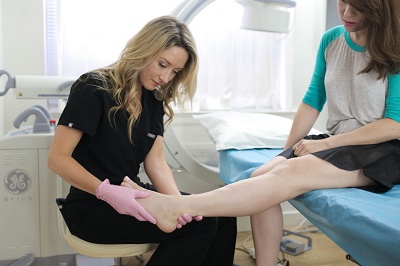Varicose veins are swollen, twisted veins that usually appear on the legs and feet. They develop when the valves in your veins become weak or damaged, leading to improper blood flow. This condition causes blood to pool, making veins visible and bulging.
Common causes of varicose veins include:
- Prolonged standing or sitting.
- Genetic predisposition.
- Hormonal changes, particularly during pregnancy or menopause.
- Obesity, which puts extra pressure on veins.
While What Kind of Doctor Treats Varicose Veins are often a cosmetic concern, they can lead to discomfort and more severe complications, such as ulcers or blood clots, if untreated. This is why timely intervention through varicose vein treatment is essential.
What Types of Varicose Vein Treatment Are Available?
Treatment options for varicose veins have evolved significantly, offering patients minimally invasive and effective solutions. Some of the most common procedures provided by a vein treatment doctors include:
1. Sclerotherapy
Sclerotherapy involves injecting a solution into the varicose veins, causing them to collapse and eventually fade. This procedure is ideal for smaller veins and spider veins, providing excellent results with minimal discomfort.
2. Endovenous Laser Therapy (EVLT)
EVLT uses laser energy to close off larger varicose veins. This treatment is performed under local anesthesia and ensures quick recovery times.
3. Radiofrequency Ablation (RFA)
RFA is another minimally invasive option that uses heat generated by radiofrequency energy to seal problematic veins. This technique is effective in reducing symptoms and improving the appearance of legs.
4. Ambulatory Phlebectomy
In this procedure, small incisions are made to remove the affected veins. It’s often recommended for veins close to the surface of the skin and is performed under local anesthesia.
5. Compression Therapy
Compression stockings are often the first step in managing varicose veins. These stockings improve circulation and alleviate symptoms but do not eliminate the veins.
Each treatment method is tailored to the severity of the condition and the patient’s individual needs. Consulting a specialized vein treatment center ensures the best course of action.
What Are the Benefits of Visiting a Vein Treatment Center?
Seeking care at a dedicated vein treatment center offers several advantages, such as:
1. Specialized Expertise
Vein treatment centers are staffed by experienced vascular specialists who focus exclusively on vein-related issues. Their expertise ensures precise diagnosis and effective treatment plans.
2. Advanced Technology
State-of-the-art equipment allows vein treatment centers to offer the latest techniques, such as ultrasound-guided procedures, which improve accuracy and outcomes.
3. Minimally Invasive Options
Most modern vein treatments are minimally invasive, requiring little to no downtime. Patients can resume daily activities almost immediately after treatment.
4. Comprehensive Care
From initial consultation to post-treatment follow-ups, vein treatment centers provide end-to-end care, addressing both aesthetic concerns and underlying health issues.
5. Improved Quality of Life
Beyond improving the appearance of legs, vein treatments alleviate pain, swelling, and other symptoms, enhancing overall quality of life.
How Do You Know If You Need Varicose Vein Treatment?
Not all varicose veins require medical intervention. However, if you experience any of the following symptoms, it’s time to consult a vein treatment center:
- Persistent leg pain or heaviness.
- Swelling in the legs or ankles.
- Skin discoloration or itching near the veins.
- Open sores or ulcers around the ankles.
- A sudden increase in the size or number of varicose veins.
Ignoring these signs can lead to complications, such as deep vein thrombosis (DVT), which requires immediate medical attention.
What Should You Expect During a Vein Treatment Consultation?
Visiting a vein treatment center starts with a thorough evaluation. Here’s what you can expect:
1. Medical History Review
The specialist will review your medical history to understand potential risk factors and underlying conditions contributing to varicose veins.
2. Physical Examination
A visual and physical examination helps determine the extent of the problem.
3. Ultrasound Imaging
Most centers use ultrasound to assess blood flow and pinpoint damaged veins. This imaging technique is crucial for devising an effective treatment plan.
4. Discussion of Treatment Options
Based on the findings, your specialist will recommend appropriate treatments, explaining the benefits, risks, and recovery expectations.
5. Insurance Guidance
Many treatments for varicose veins are covered by insurance, especially if they address medical concerns. Vein treatment centers often assist with the insurance process.
Are There Risks Associated With Varicose Vein Treatment?
While modern varicose vein treatments are safe and effective, any medical procedure carries some risks. Potential complications include:
- Mild bruising or swelling.
- Temporary skin discoloration.
- Rarely, infection or nerve damage.
Choosing a reputable vein treatment center with experienced professionals minimizes these risks. Following post-procedure care instructions also ensures smooth recovery.
How Long Does It Take to Recover From Varicose Vein Treatment?
Recovery times vary depending on the type of treatment. Most minimally invasive procedures allow patients to return to normal activities within a day or two. However, full recovery may take a few weeks, during which wearing compression stockings and avoiding strenuous activities is recommended.
How Can You Prevent Varicose Veins From Recurring?
Even after successful treatment, adopting healthy lifestyle habits can reduce the risk of recurrence. Here are some tips:
- Stay physically active to improve circulation.
- Maintain a healthy weight to reduce pressure on your veins.
- Avoid prolonged sitting or standing.
- Elevate your legs periodically to promote blood flow.
- Wear compression stockings if advised by your specialist.
Regular check-ups at a vein treatment center can also help monitor vein health and address issues promptly.
Why Choose a Vein Treatment Center Over General Clinics?
A vein treatment center focuses exclusively on vascular issues, offering specialized care that general clinics cannot match. These centers are equipped with advanced tools and staffed by experts, ensuring superior outcomes for patients dealing with varicose veins.
From cosmetic improvements to addressing serious medical concerns, vein treatment centers cater to all aspects of vein health, making them the best choice for effective care.
Conclusion
Varicose vein treatment is not just about improving the appearance of your legs; it’s about enhancing your overall well-being. Whether you’re dealing with mild discomfort or severe symptoms, seeking help at a reputable vein treatment center ensures effective, personalized care.
Don’t let varicose veins impact your quality of life. Explore your treatment options today and take the first step toward healthier, pain-free legs.




